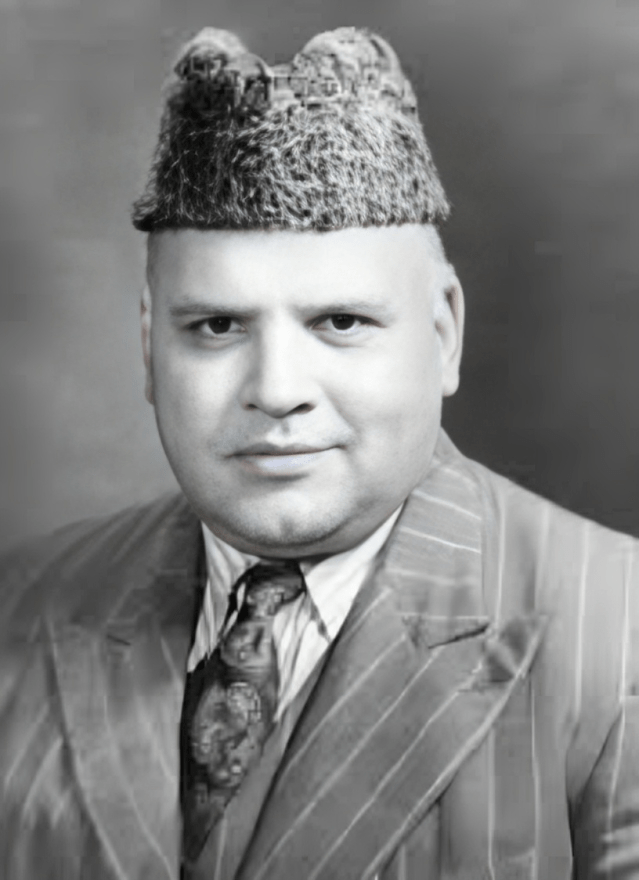In the history of N.W.F.P, non-pushtoon political leaders rarely enjoyed success as well as popularity but Khan Abdul Qayyum Khan being non-pushtoon dominated the political scenario and remained popular even in the pushto speaking population of the province. Khan Abdul Qayyum Khan was born on July 16, 1901 at Chitral. His father Abdul Hakeem Khan did not enjoy the high social status but his elder brother Justice Khan Abdul Hameed Khan remained the President and Prime Minister of Azad Kashmir. So politics was not alien to him. He was actively engaged in the Pakistan movement, and is among those precursors, who lived for so long after the creation of Pakistan and served the country with his administrative as well as political in-depth needed to unite different political factions.
Khan Abdul Qayyum Khan got his early education from Islamia College Peshawar, Aligarh University and later completed B.Sc. honors in economics from School of Economics in London and in 1926 did his Bar at Law from England. He started practice as a lawyer in Peshawar and due to his knack for politics joined All India Congress Party, which was the only organized political party in N.W.F.P, as Muslim League at the time did not get root in the province. He played an active role in the Civil Disobedience Movement. Qayyum Khan was elected as the member of All India Legislative Assembly in general election of 1937. The association with Hindu leaders and All India Congress gave him an ample chance to judge their candor and sincerity. Soon he found that their ideas were contradictory and antagonistic against the Muslims. After Shimla Conference 1945 Quaid-i-Azam foretold “Qayyum Khan you will join Muslim league one day”. He resigned from All India Congress and joined Muslim League in September 1945 at Lahore. He then became the leader of the Opposition in the Frontier Assembly. In the election of 1946 Muslim League under his leadership captured 17 seats, 10 from Hazara and 7 from rest of the province in the Frontier Assembly. He had to meet a very difficult challenge when under the 3rd June Plan a referendum was to be held in the province from 6-17 July 1947, whether the people of the province want to join India or Pakistan. Qayyum Khan went door to door to convey the message of the league in the remote areas of the province and paved the way to transform the Muslim sentiments towards Pakistan. Due to the collective efforts of Qayyum Khan and other league leaders, the results of the referendum announced on 20 July were in favor of Pakistan. Votes cast in favor of Pakistan were 289,244, while those in favor of India were only 2,874. After the dismissal of Dr. Khan Sahib’s ministry on August 22, 1947, Qayyum Khan became the first Chief Minister of N.W.F.P in independent Pakistan.
Qayyum Khan with his political experience controlled the issue of Pakhtunistan, which was for the first time was mooted by Red Shirts during May, 1947 as “a free Pathan state within India”. In 1953 he was appointed as Federal Minister for food, Agriculture and Industry by Mohammad Ali Bogra. After the death of Abdur Rab Nishtar in 1957, he was elected as the President of Pakistan Muslim League by consensus. During Ayub’s era since he was struggling for democracy, he was kept in jail and disqualified for any people’s representative office for five years. The tussle among different League factions compelled Qayyum Khan to form a separate league under his own Presidentship. In the first general election in the history of Pakistan in 1970 his party captured many seats in all provincial assemblies. After the separation of East Pakistan, he joined hands with Bhutto and made a coalition government and took oath as Federal Minister for Interior, Kashmir and Northern Areas but differences arose between Zulfiqar Ali Bhutto and Qayyum Khan and he resigned from the Ministry on January 19, 1977.
Having served the nation with commitment and capability, he breathed his last on October 22, 1981 at Islamabad due to heart attack and was buried at Peshawar.
This article was last updated on Friday, Jan 04, 2008






